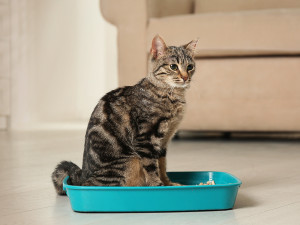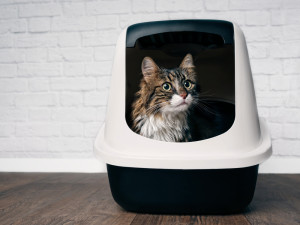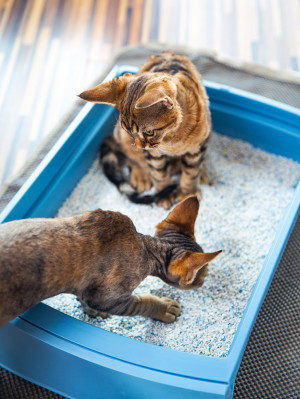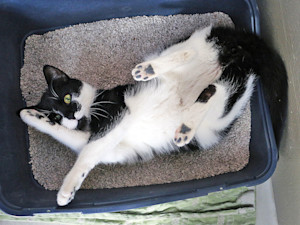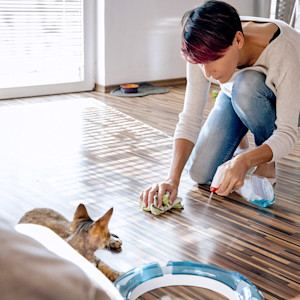13 Reasons Why Your Cat Is Peeing Outside the Litter Box, and How to Fix It
Our experts reveal why this might be happening.

Share Article
In This Article:
Why Is My Cat Peeing Outside the Litter Box Medical Concerns Changes in Their Environment Problems with Their Litter Box How to Stop Your Cat From Peeing Where They Shouldn’t Signs It’s Time to Consult a Veterinarian for Home Soiling Final Thoughts: Why Your Cat Is Peeing Outside the Litter Box Frequently Asked Questions
Cats are full of quirky behaviors that keep cat parents entertained, amused, and occasionally on edge. Chasing a butterfly’s shadow? Cute. Twitching from mid-afternoon dreams? Adorable. Climbing the stairs on the wrong side of the railing? A bit daredevilish. Knocking things off the coffee table?
Annoying, but you let it slide. But peeing outside of the litter box? That’s not quirky; that's crossing the line. Find out why your cat may be doing this and how you can help your cat instead of declaring war.
Main takeaways
Always check for medical issues that could possibly cause your cat’s inappropriate urination.
Stress can be a huge trigger; moving, traveling, new pets, and drastic changes in routine can lead to behavior changes and peeing outside the litter box.
Make sure the litter box is clean and to your cat’s liking. Consider the type of litter, type of litter box, and its location.
Never punish your cat for house soiling: it could make things worse.
Why is my cat peeing outside the litter box?
Your gut reaction to finding pee outside of the littler box may be to label your cat as an a-hole, but your cat is likely peeing outside of the box due to a medical or environmental issue, not because they hate you. Urinating in inappropriate placesopens in new tab may be your cat’s way of signaling that something is wrong. They may be experiencing pain, a constant urge to pee, or emotional distress. Despite any frustration you may feel, it’s important to remember that this behavior is rarely out of the blue — we just have to connect the dots. This might mean scheduling a veterinary visit or taking a close look at your cat’s day-to-day life with a fresh perspective.

Medical concerns
If your cat is peeing outside of the litter box, the first step is to rule out a medical issue. Medical conditions can lead to undesirable behavior changes, especially if they involve a cat’s urinary tract. Your vet will perform a physical exam and recommend diagnostic tests like urinalysis, blood work, or radiographs (x-rays) to rule out some of these issues.
Urinary tract infection (UTI)
A common reason cats display inappropriate urination is a urinary tract infection (UTI). Urinary tract infections in cats develop from bacteria traveling up the urethra and into the bladder. The bacteria usually remain in the bladder but can travel to the kidneys if a UTI is left untreated. Kidney infections, a condition called pyelonephritis, can make cats very sick and require more aggressive care compared to a simple UTI.
Feline idiopathic cystitis (FIC)
Feline idiopathic cystitis (FIC) is a condition in which a cat’s bladder becomes inflamed for no known reason (hence the term idiopathic, which means “of unknown cause”). Symptoms of FIC often mimic those of a UTI, although no bacteria are present. Stress is commonly considered a major contributing factor in cats with FIC.
Kidney disease
Various forms of kidney disease, such as infection, acute injury, or chronic kidney failure, can result in abnormal urination habits. Cats with kidney disease often have to pee more frequently than normal, leading many cats to pee outside their litter box.
Diabetes
One of the key signs of diabetes in cats is increased urination and thirst, also called polyuria/polydipsia (PU/PD). Persistently high blood sugar causes glucose to spill over into the urine, leading to more frequent urination. Some cats will visit the litter box more often, while other cats will pee outside of the box because of the abnormal uptick in their need to urinate.
Arthritis or mobility issues
Sometimes, cats will pee outside of the litter box because it’s simply too difficult or painful to climb into it. Many cat parents prefer high-sided litter boxes, especially for cats who get overzealous about kicking cat litter around. But climbing over the high sides can be too taxing for some senior cats or cats that have sustained injury to their back, hips, or limbs. Instead of enduring the pain, they’ll opt to relieve themselves someplace easier to reach.
Behavioral problems
Once medical issues are ruled out as a possible cause of urinating outside the litter box, it’s time to investigate a cat’s behavior.
Marking
Cats use scent to mark territory and communicate, and urine marking is a compelling way to say something is “theirs.” Urine spraying is different from eliminating (emptying the bladder) and cats typically have different body positions for each behavior. When eliminating, cats will hunch or squat and produce large puddles of pee. When urine spraying, they’ll usually stand upright, vibrate their tails, and spray small amounts of urine on vertical objects like walls and furniture. Though these differences are not foolproof, they can help you determine which behavior your cat is displaying.
Stress or anxiety
Cats are often labeled as being aloof, but they are sensitive creatures. Stress and anxietyopens in new tab can cause cats to act out in several different ways, and inappropriate urination is a common consequence of stress.
Changes in their environment
If your cat recently started peeing outside the litter box, it may be in response to a change at home. Abrupt changes in a cat’s environment can disrupt their daily routines and their overall level of comfort. These are some common triggers for behavior changes.
New pet or family member
Some cats enjoy everyone’s company, while others take a “no new friends” approach to meeting new people and pets. Your cat may not think the new puppy or kitten additionopens in new tab to the household is cute and fun; their new sibling may be stressing them out. Peeing outside the box may be a way to announce their stress or their refusal to share.
New home
A new house can be exciting, but learning an unfamiliar place can be overwhelming for your cat. Cats may have urinary accidents after moving to a new home due to anxiety or simply not knowing the new location of the litter box.
Any change in your normal routine
Cats love routine and predictability. But life happens, and sometimes daily routines get disrupted, upsetting your cat. Any change in your normal routine can cause a cat to act out, including vacations, home renovations, and changes in your work schedule.
Problems with their litter box
If a cat’s litter box isn’t to their liking, they won’t order a new one online; they just won’t use it. Litter box aversion, or refusal to use a litter boxopens in new tab, can develop for a number of reasons.
Dirty litter box
Nobody wants to use an unflushed toilet, and your cat is no different. If the litter is constantly soiled, your cat may scope out a cleaner place to urinate.
Type of litter or litter box
Cats can be particular about the type of litter and litter box they use. Some cats are sensitive to the smell, dust level, or texture of their cat litter, while others have strong preferences for covered versus uncovered boxes. The size of the litter box is important as well. Larger cats don’t want to be forced to contort themselves to eliminate in small spaces.
Litter box location
Litter box location can also make a big difference in your cat’s potty habits. Cats prefer quiet, low-traffic areas where they can have some privacy, away from loud appliances like washing machines. Having their litter box too close to their food or bedding can also be a huge turn-off.
Not enough litter boxes
In multi-cat households, having enough litter boxes is crucial. While some cats will begrudgingly share a litter boxopens in new tab, others will refuse to use a soiled box, especially one soiled by another cat. A general rule of thumb is to have one box per cat, plus one extra, and have them spaced apart to avoid kitty bathroom battles.
How to stop your cat from peeing where they shouldn't
Living with a cat who keeps urinating outside of their litter box is challenging, but there are some steps you can take to make their bathroom situation more ideal.
Keep it clean: Scoop the litter box regularly to ensure your cat always has a fresh place to go. Change the litter and perform a deep cleaningopens in new tab at least once a week to keep odors at bay and maintain sanitary conditions.
Improve accessibility: Offer a low-sided litter box for senior cats, cats with injuries or chronic pain, or those who simply prefer it.
Look at location: Avoid placing litter boxes in areas with lots of foot traffic and loud noises.
Provide enough boxes: Make sure you have one box per cat, plus an extra.
Trial and error: Slowly experiment with different types of litter, scents, and litter box types. Cats can be picky, and finding the right combination may take some time.
Check with your vet: Schedule routine checkups to catch medical issues early. Talk to your vet if your cat’s bathroom behavior suddenly changes.
Signs it's time to consult a veterinarian for home soiling
If your cat is consistently soiling outside the litter boxopens in new tab, it could be a sign of an underlying issue that needs medical attention. While the occasional accident may have an obvious cause (like the time you were sick in bed for two days and didn’t prioritize scooping the box), certain changes in your cat’s habits may indicate it's time to consult a veterinarian. Here are some signs that call for a vet visit:
Frequent urination
Bloody urine
Cloudy urine
Urine with a strong or foul odor
Straining to pee
Posturing to pee, but nothing is coming out
Changes in eating or drinking habits
Additional symptoms like vomiting, diarrhea, or lethargy
Excessive licking and grooming
You're at your wit’s end (Seriously. Some cat parents get so frustrated with inappropriate urination that they consider drastic measures like rehoming or even euthanizing their cat. Don’t let it get that far).
Final thoughts: Why your cat is peeing outside the litter box
Medical issues or stress-related behaviors can cause a cat to pee outside the litter box. Although it’s frustrating and smelly, it’s important to focus on finding the cause and a solution. Never punish your cat for inappropriate urination; it often makes things worse. Consult with your veterinarian to rule out medical issues and make sure your cat’s litter boxes are clean and suitable for your cat. In some cases, a veterinary behaviorist can help uncover the underlying cause, letting you and your cat find harmony again.
FAQs
How do I stop my cat from peeing in the house?
You can help stop or prevent your cat from peeing in the house by scheduling regular checkups to ensure your cat is healthy, keeping litter boxes clean, providving enough litter boxes, and placing them in quiet, private areas.
Should I punish my cat for peeing outside the litter box?
Never punish your cat for peeing outside of the litter box. That can increase their stress level and make matters worse. Instead, talk to your vet about possible medical issues and evaluate your cat’s litter box conditions for possible improvements.
Why is my cat peeing on the floor but pooping in the litter box?
Your cat may be peeing on the floor but pooping in the litter boxopens in new tab if they have medical issues related to their urinary tract, are urine spraying to mark territory, or prefer to only use their pee as a signal that something is wrong.
Why is my cat peeing over the edge of the litter box?
Providing a litter box that is too small can lead to your cat accidentally peeing over the side of the litter box. Make sure your cat can fit comfortably in their box.
References
Heath, Sarah. “Common Feline Problem Behaviours: Unacceptable Indoor Elimination.” Journal of Feline Medicine and Surgery, vol. 21, no. 3, 25 Feb. 2019, pp. 199–208, https://doi.org/10.1177/1098612x19831202opens in new tab.
“Feline Behavior Problems: House Soiling.” Cornell University College of Veterinary Medicine, 23 July 2018, www.vet.cornell.edu/departments-centers-and-institutes/cornell-feline-health-center/health-information/feline-health-topics/feline-behavior-problems-house-soilinopens in new tabg.
AVMA. “Feline Lower Urinary Tract Disease (FLUTD) | American Veterinary Medical Association.” Www.avma.org, www.avma.org/resources-tools/pet-owners/petcare/feline-lower-urinary-tract-diseaseopens in new tab.

Dr. Alycia Washington, DVM, MS
Alycia Washington is a small-animal emergency veterinarian with over 10 years of experience based in North Carolina. She works as a relief veterinarianopens in new tab and provides services to numerous emergency and specialty hospitals. She also works as a veterinary writer with a focus on educating pet parents.
Related articles
![two cats sharing litter box]()
Can Cats Share a Litter Box?
The better question is should they?
![Cat sitting in a teal litter box]()
How to Train a Cat to Use a Litter Box
If you do nothing else, teach your cat to poop in their litter box (not your shoe).
![Funny black and white cat laying in litter box.]()
Why Is My Cat Chilling in the Litter Box?
Here are four reasons why the litter box is your cat’s new favorite spot.
Why Does My Cat Poop Outside of the Litter Box?
The worst kind of surprise.
Should You Train Your Cat to Use the Toilet?
This is not Meet the Parents.
![Woman cleaning up her cat's mess on the floor.]()
How to Get Rid of Cat Pee Smell
Dream big, folks—because it’s possible.

